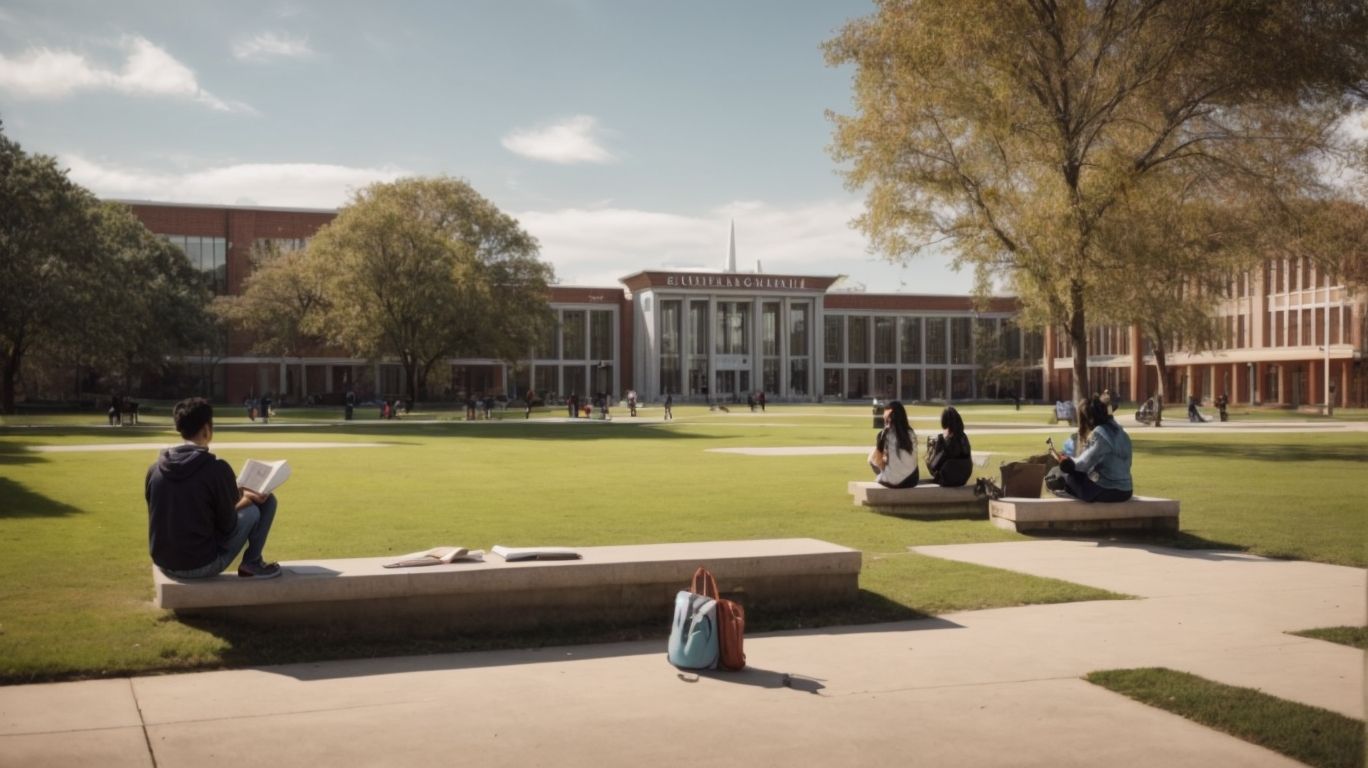Are you considering studying psychology in the Philippines? Look no further! In this article, we will explore the top universities for psychology in the Philippines, including the University of the Philippines Diliman, Ateneo de Manila University, De La Salle University, University of Santo Tomas, and University of San Carlos.
We will also discuss the various specializations in psychology offered in the country, such as clinical psychology, industrial-organizational psychology, counseling psychology, educational psychology, and developmental psychology. We will outline the requirements for studying psychology in the Philippines, including the need for a high school diploma or equivalent, entrance exams, interviews and/or essays, GPA and/or class ranking, as well as recommendations and extracurricular activities.
Let’s dive in and discover why studying psychology in the Philippines could be the right choice for you!
Contents
- 1 Why Study Psychology in the Philippines?
- 2 Top Universities for Psychology in the Philippines
- 3 What are the Specializations in Psychology Offered in the Philippines?
- 4 What are the Requirements for Studying Psychology in the Philippines?
- 5 What are the Career Options for Psychology Graduates in the Philippines?
- 6 Conclusion
- 7 Frequently Asked Questions
- 7.1 What are the best places to study Psychology in the Philippines?
- 7.2 Are there any specialized schools for studying Psychology in the Philippines?
- 7.3 What are the advantages of studying Psychology in the Philippines?
- 7.4 Are there any scholarships available for studying Psychology in the Philippines?
- 7.5 Can international students study Psychology in the Philippines?
- 7.6 What is the job outlook for graduates of Psychology in the Philippines?
Why Study Psychology in the Philippines?
Studying Psychology in the Philippines offers a unique opportunity to delve into the fascinating realm of human behavior and mental processes, combining theoretical knowledge with practical applications.
One of the key benefits of pursuing Psychology in the Philippines is the diverse range of academic programs available, catering to various interests within the field. Whether you are inclined towards clinical psychology, industrial-organizational psychology, or educational psychology, universities like the University of the Philippines and Ateneo de Manila University offer specialized courses that equip students with comprehensive understanding and skills.
- This breadth of academic offerings allows students to tailor their education to their specific career goals, enhancing their employability and readiness for the dynamic job market.
- Studying Psychology fosters critical thinking, empathy, and communication skills, which are invaluable not only in professional settings but also in personal relationships.
- The impact of Psychology on individuals and society is profound, as it plays a crucial role in fostering mental health awareness, promoting well-being, and addressing social issues.
Top Universities for Psychology in the Philippines
The Philippines boasts several prestigious universities renowned for their exceptional Psychology programs, providing students with a solid foundation in the field and preparing them for diverse career paths.
University of the Philippines Diliman
The University of the Philippines Diliman stands out as a premier institution for Psychology education in the Philippines, known for its rigorous curriculum and high passing rates in licensure exams.
One of the unique features of the Psychology program at UP Diliman is its distinguished faculty. The department boasts renowned professors who are both academics and practitioners in their respective fields. Their expertise covers various subfields of psychology, providing students with a well-rounded education.
The program’s success in licensure exams is a testament to the quality of education offered. Graduates from UP Diliman consistently perform exceptionally well in the licensure exams, reflecting the program’s effectiveness in preparing students for professional practice.
Ateneo de Manila University
Ateneo de Manila University excels in offering a comprehensive Psychology program that equips students with the knowledge and skills needed to succeed in board exams and pursue fulfilling careers.
The Psychology program at Ateneo de Manila University stands out for its rigorous curriculum designed to prepare students for licensure exams and real-world challenges. With a strong focus on building a solid foundation in core psychological principles, students also have the opportunity to take specialized courses tailored to their interests.
The university provides extensive support to students seeking to enter the workforce, offering career development workshops, internships, and networking opportunities to help them kickstart their professional journey in the field of Psychology.
De La Salle University
De La Salle University offers a dynamic Psychology curriculum that prepares students for a wide range of career options in the field, emphasizing practical skills and theoretical foundations.
Students enrolled in this program gain valuable insights into human behavior through a combination of theoretical courses, hands-on practical experiences, and engaging research projects. The curriculum is designed to equip students with the necessary tools to excel in various pathways, whether in clinical settings, research institutions, educational environments, or corporate organizations.
De La Salle University’s Psychology program fosters strong connections with industry partners, providing students with opportunities for internships, guest lectures from professionals in the field, and networking events that enhance their exposure to real-world applications of psychological principles.
University of Santo Tomas
The University of Santo Tomas stands as a reputable institution for Psychology education, offering specialized tracks for aspiring guidance counselors and ensuring accreditation for professional practice.
With a strong emphasis on providing practical hands-on experience, the Psychology programs at the University of Santo Tomas are designed to equip students with the necessary skills and knowledge to excel in the field.
Guidance counseling is a key focus area within the curriculum, allowing students to delve deep into this specialized field and understand the complexities of offering guidance and support to individuals in need. The accreditation status of the programs ensures that graduates are well-prepared to pursue their professional aspirations with confidence and credibility.
University of San Carlos
The University of San Carlos provides a comprehensive Psychology program with a strong emphasis on psychometrics, equipping students with the skills needed for diverse career paths in the field.
Within the psychology program, students can specialize in psychometrics, gaining expertise in the measurement of psychological constructs. This specialization opens up avenues for partnerships with industry leaders seeking professionals adept at analyzing and interpreting data to make informed decisions. The University of San Carlos fosters practical applications of psychometrics, preparing students for roles in various industries such as human resources, market research, and educational assessment.
What are the Specializations in Psychology Offered in the Philippines?
Psychology in the Philippines offers a diverse range of specializations, including clinical psychology, industrial-organizational psychology, counseling psychology, educational psychology, and developmental psychology, catering to varied interests and career paths.
Each specialization in psychology provides a unique focus area that corresponds to different aspects of human behavior and mental processes. Clinical psychology focuses on diagnosing and treating mental illnesses, while industrial-organizational psychology applies psychological principles to workplace settings. Counseling psychology emphasizes helping individuals cope with personal issues, educational psychology centers around learning and educational environments, and developmental psychology studies human growth and development across the lifespan.
Clinical Psychology
Clinical Psychology in the Philippines encompasses the assessment and treatment of mental health disorders, preparing students for licensure exams and clinical practice in various settings.
One of the key aspects of pursuing a career in Clinical Psychology specialization in the Philippines is the rigorous training process that individuals undergo to become competent professionals.
Prospective clinical psychologists typically pursue a master’s or doctoral degree in psychology, focusing on courses that cover areas such as psychopathology, psychological assessment, and therapeutic interventions. Hands-on clinical experience through internships and supervised practice is crucial to develop the necessary skills.
Upon completion of their academic and practical training, aspiring psychologists must pass the licensure exam administered by the Professional Regulation Commission (PRC) in the Philippines.
Industrial-Organizational Psychology
Industrial-Organizational Psychology in the Philippines focuses on workplace dynamics, organizational behavior, and human resources management, offering diverse career opportunities in corporate and consulting settings.
This specialization equips professionals with the knowledge and skills to enhance organizational efficiency, employee productivity, and workplace satisfaction. By applying psychological principles and research methods, individuals in this field play a crucial role in talent acquisition, training, performance evaluation, and organizational development. The demand for Industrial-Organizational Psychologists is on the rise in the Philippines as businesses recognize the value of optimizing their human capital. Graduates can pursue roles such as HR consultant, talent management specialist, organizational development manager, or leadership coach, among others.
Counseling Psychology
Counseling Psychology plays a crucial role in mental health support and guidance services in the Philippines, training aspiring professionals to become competent guidance counselors and provide effective emotional support.
In the Philippines, therapy interventions offered by counseling psychologists are tailored to address a wide range of mental health concerns, including anxiety, depression, trauma, and relationship issues. These professionals utilize evidence-based practices such as cognitive-behavioral therapy, mindfulness techniques, and psychoeducation to equip individuals with the skills to navigate challenging emotions and situations.
Building a career in Counseling Psychology in the Philippines necessitates a comprehensive educational background encompassing courses in psychology, counseling theories, human development, and ethics. Practical training through internships and supervised practice is also crucial for acquiring the necessary clinical skills and competencies required to support clients effectively. Ongoing professional development and adherence to ethical guidelines are essential components of maintaining high-quality counseling services.
Educational Psychology
Educational Psychology emphasizes the application of psychological principles in educational settings, enhancing teaching methodologies, curriculum development, and student learning outcomes in the Philippines.
Through the lens of Educational Psychology in the Philippines, educators delve into understanding how students learn and develop, catering teaching approaches to diverse learning styles and abilities. This specialization plays a pivotal role in shaping curriculum design, ensuring it aligns with cognitive processes and creates meaningful learning experiences. By incorporating human behavior theories and motivational strategies, educational practitioners can foster a positive classroom environment that promotes student engagement, critical thinking, and academic success.
Developmental Psychology
Developmental Psychology in the Philippines centers on the study of human growth and behavioral changes across the lifespan, with a particular focus on child development, cognitive abilities, and social interactions.
One of the key aspects in understanding child development is examining the various stages and milestones that individuals go through from infancy to adolescence. Researchers in this field often analyze the intricate cognitive processes that shape how children learn, think, and solve problems. The role of social interactions and relationships in shaping a child’s development is also a core focus, highlighting the importance of family dynamics, peer relationships, and societal influences on behavior.
What are the Requirements for Studying Psychology in the Philippines?
Studying Psychology in the Philippines entails meeting specific requirements, including a high school diploma or equivalent, successful performance in entrance exams, maintaining a competitive GPA, and demonstrating strong recommendations and extracurricular involvement.
These prerequisites are crucial considerations for aspiring psychologists in the Philippines, as they set the foundation for a successful academic journey in this field. Academic qualifications play a significant role in the application process, with universities often looking for a strong background in subjects like psychology, biology, or social sciences.
Entrance assessments such as the Psychology Aptitude Test (PAT) are commonly required, assessing the candidate’s knowledge and aptitude for the field. Prospective students also need to provide supplementary application materials like personal statements, letters of intent, and resumes, highlighting their passion for psychology and relevant experiences.
What are the Career Options for Psychology Graduates in the Philippines?
Psychology graduates in the Philippines have a wide array of career options available, including roles as guidance counselors, Psychologists, and Psychometricians, with opportunities in various sectors such as education, healthcare, and research.
Career as a Guidance Counselor
A career as a Guidance Counselor in the Philippines involves providing academic and personal support to students, requiring licensure through specialized exams and continuous professional development.
Guidance Counselors play a crucial role in the educational landscape, offering guidance on academic, career, and personal matters to help students navigate the challenges they face. These professionals conduct assessments to identify students’ needs and provide counseling sessions to address various issues.
Effective communication skills are paramount in this role, as Counselors must build trust and rapport with students to facilitate positive outcomes. Emotional intelligence is another key attribute for handling sensitive situations and fostering a supportive environment for student growth and development.
Career as a Psychologist
Embarking on a career as a Psychologist in the Philippines involves conducting assessments, therapy sessions, and research activities, with licensure obtained through board exams and ongoing education.
Psychologists in the Philippines typically work in various settings, including hospitals, private practices, educational institutions, and government agencies. Their clinical duties involve assessing, diagnosing, and treating mental health disorders, offering psychotherapy to individuals, couples, families, or groups. Plus direct patient care, psychologists are actively engaged in research to contribute to the development of evidence-based practices in psychology.
To become a licensed professional, aspiring psychologists need to pass the Psychology Licensure Exam administered by the Professional Regulation Commission (PRC). This rigorous exam assesses the candidate’s knowledge and competence in various areas of psychology.
Career as a Psychometrician
A career as a Psychometrician in the Philippines involves designing and administering psychological tests, analyzing data, and interpreting results to support decision-making processes in diverse industries.
Psychometricians play a crucial role in creating assessments that measure various psychological constructs such as intelligence, personality traits, and abilities. They possess strong test development skills to construct reliable and valid tests that adhere to standardized protocols and ethical guidelines.
Data analysis competencies are also paramount in the field, as Psychometricians must have a deep understanding of statistical methods to accurately interpret test results. Their expertise in statistical software and techniques allows them to derive meaningful insights from complex data sets.
These assessments find applications in sectors like education, healthcare, recruitment, and organizational development, aiding in decision-making, career guidance, and talent management. The insights provided by Psychometricians help organizations optimize their processes and strategies based on individuals’ psychological profiles and aptitudes.
Conclusion
The field of Psychology in the Philippines offers a rich tapestry of academic opportunities and rewarding career prospects, enableing graduates to make meaningful contributions to individual well-being and societal advancement.
With the growing awareness of mental health, the demand for skilled professionals in various Psychology specializations is on the rise. Pursuing a degree in Psychology equips individuals with a deep understanding of human behavior, cognitive processes, and emotional well-being. This knowledge is fundamental in addressing societal issues, providing therapy, conducting research, and fostering a deeper understanding of human interactions within the community.
Frequently Asked Questions
What are the best places to study Psychology in the Philippines?
Some of the top universities in the Philippines for Psychology include University of the Philippines Diliman, Ateneo de Manila University, De La Salle University, University of Santo Tomas, and Miriam College.
Are there any specialized schools for studying Psychology in the Philippines?
Yes, there are specialized schools for studying Psychology in the Philippines such as the Philippine Women’s University – School of Psychology, Philippine Normal University – Department of Psychology, and Polytechnic University of the Philippines – Institute of Psychology.
What are the advantages of studying Psychology in the Philippines?
Studying Psychology in the Philippines offers a diverse and multicultural perspective, as well as the opportunity to learn from experienced and knowledgeable faculty members. It also provides hands-on experience through internships and practical training.
Are there any scholarships available for studying Psychology in the Philippines?
Yes, there are various scholarships available for studying Psychology in the Philippines, such as the CHED Scholarship Program, DOST-SEI Scholarship, and private university scholarships. Students can also apply for financial aid or grants from the universities themselves.
Can international students study Psychology in the Philippines?
Yes, international students can study Psychology in the Philippines as long as they meet the admission requirements and have the appropriate visa. They may also be required to take an English proficiency test.
What is the job outlook for graduates of Psychology in the Philippines?
The job outlook for Psychology graduates in the Philippines is promising, with opportunities in various fields such as mental health, education, human resources, and research. Graduates can also pursue further studies or take licensure exams to become licensed psychologists.



